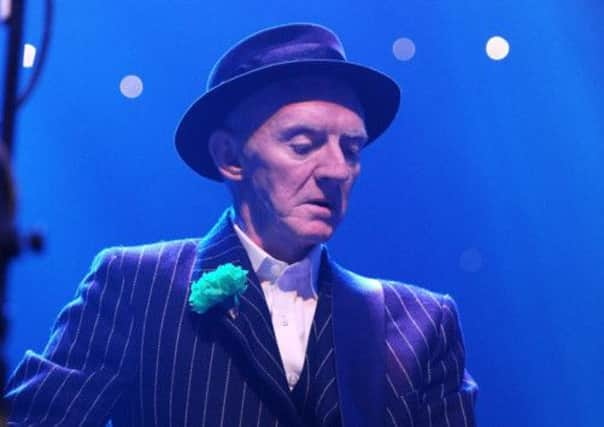Obituary: Phil Chevron (Philip Cook), musician


Philip Cook, who used the alias Phil Chevron throughout his entire public career, was the lead singer of Radiators From Space, who were widely regarded as having been the first punk band to emerge from Ireland during the punk explosion of the late 1970s. He would go on to join the internationally renowned London-Irish folk-punk band the Pogues as a multi-instrumentalist on their 1985 second album Rum, Sodomy and the Lash, and would remain a popular figure in the band through to his death.
Cook was raised in the Dublin suburb of Santry, and his father was an actor and theatre producer, which resulted in a love of music and performance from a young age.
Advertisement
Hide AdAdvertisement
Hide AdAt the age of 16, unimpressed with David Bowie or Irish rockers Horslips, he became a great fan of the Irish cabaret singer Agnes Bernelle; in 1985 he would produce her record Father’s Lying Dead on the Ironing Board, a revisiting of classic Berlin cabaret songs which was released by Elvis Costello’s IMP label and described by the New Musical Express as “the strangest LP of the year”.
In 1976 Cook would form the Radiators From Space in Dublin alongside Pete Holidai, Steve Rapid (Steve Averill), Jimmy Crashe and Mark Megaray, and it was at this point that he would adopt the Phil Chevron alias.
Although it has been speculated that he took the surname from the American label Chevron, home of artists including Bing Crosby and Judy Garland, he said in 2009 that he’d forgotten its origins and joked that it could have been an attempt to fool hotel staff into thinking he was the heir to the oil multinational. Radiators From Space would go on to enjoy a certain amount of success on their home city’s growing punk scene, charting in the Irish charts with their debut single Television Screen, although their organising a punk festival in the city would see trouble break out on the day when a member of the audience died.
With local promoters now unwilling to book the group, they moved en masse to London, where they would rename themselves the Radiators and release their second album Ghostown in 1979. Despite the fact that it was produced by former Bowie producer Tony Visconti and received glowing reviews at the time, the album was not a commercial success.
Although has gone on to be regarded in the band’s home country as one of the finest Irish rock albums of all time, with celebrated Irish musician Christy Moore having made the song Faithful Departed a staple of his own set, the band would split in 1981, before such recognition arrived.
Remaining in London, Chevron recorded and release an EP of Brecht and Weill songs entitled Songs From Bill’s Dancefloor, which he performed with Moore’s group Moving Hearts, while his job at Camden’s Rock On record store brought him a friendship with regular customer Elvis Costello. In 1984, Costello released Chevron’s Brendan Behan-inspired single The Captain and the Kings through IMP.
An unsuccessful attempt to persuade fellow Irish émigrés the Pogues’ manager Frank Murray to manage him afforded Chevron the opportunity to play banjo on their forthcoming world tour in support of their 1984 debut album Red Roses For Me, temporarily replacing Jem Finer while he was on paternity leave.
He was invited to remain as a full member for 1985’s follow-up Rum, Sodomy and the Lash, taking over on guitar once Shane MacGowan decided to concentrate on singing
Advertisement
Hide AdAdvertisement
Hide AdChevron continued to be an integral part of the Pogues’ rowdy Celtic style through the commercial high point of the late 1980s, touring the world with the albums If I Should Fall From Grace With God (1988) and Peace and Love (1989), and playing on their signature tracks Irish Rover and Fairytale of New York. He would also write the fan favourite Irish migrant’s ballad Thousands Are Sailing, among other songs for the group.
The group’s critical and commercial standing would falter following the departure of MacGowan due to drink and drug issues in 1991, and Chevronleft in 1994 for similar reasons in the wake of 1993’s MacGowanless Waiting For Herb album.
The group dissolved in 1996, but reunited again in 2001 with both MacGowan and Chevron in the fold for a fruitful touring schedule which would continue throughout the decade.
During this period he also revived his old band as the Radiators (Plan 9) with his old Pogues bandmate Cait O’Riordan for some cult but not commercially successful new recordings, while he also became the Pogues’ unofficial spokesman, interacting with fans on the band’s official forum.
Chevron was diagnosed with oesophageal cancer in 2007, but he responded to treatment and was given the all-clear in 2009, having played a full part in the Pogues’ tour of America the year before.
However, it was announced in May this year that the cancer had returned in a more aggressive form.
Chevron’s final public appearance would be at a fundraiser held in his name at Dublin’s Olympia Theatre in August, which was attended by Irish stars including the actor Aidan Gillen, the novelist Roddy Doyle and McGowan himself.
Philip Cook, aka Phil Chevron, died on Tuesday, 8 October, 2013 in Dublin. He is survived by his mother and sister.